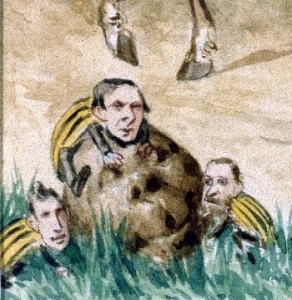At the end of 1887, the Tory government’s ‘grim savagery … the policy of repression’ provoked a decisive counter-attack from Irish nationalists.
Mr William Phillips, Liberal, humanitarian, author of The Irish Home Rule Catechism for the English People (1886) and vice-chairman of Gladstone Candidates Election Fund, took up residence in the West of Ireland, ‘I am determined, in 1887, to go over and see and judge for myself …’.
At the end of the year, the Manchester Guardian‘s Irish correspondent wrote of a ‘very remarkable letter written by Mr Davitt to Mr Phillips … I should not wonder if new methods were soon to be taken up on lines less likely to suit Mr Balfour’s calculations than those with which he has had hitherto to deal’.
The Irish Liberal alliance, determined to topple the Tory government and bring in Home Rule, was preparing for a confrontation. O’Connor Power travelled to North America to promote the Home Rule agenda and organise its supporters.
See That Irishman, Part Four, Taking a Stand.
In April 1896, William Phillips retired from active political life. His colleagues in the National Liberal Club presented him with a life size portrait of himself. O’Connor Power gave a vote of thanks. Bristol Mercury, 20 April 1896.
